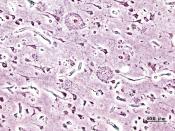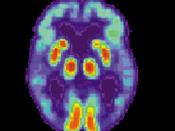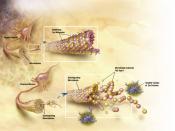AlzheimerÃÂs is a disease that affects the part of your brain that controls your short term memory. AlzheimerÃÂs may also affect the persons abilities like learning, reasoning, making wise judgments, communication with others and it will most likely affect all of their daily activities. As you get older the risk of you getting AlzheimerÃÂs disease increases every five years after you hit age sixty-five.
Scientists have not yet found an underlying cause for the disease but they have come a long way with research over the last 15 years. One type of Alzheimer's which mainly affects people over the age of 65 is called Late-onset Alzheimer's. This form of Alzheimer's and every other form of Alzheimer's is a genetic disease. Even though the symptoms do not appear until your much older, the disease can start as early as your thirties. Alzheimer's slowly degenerates and kills nerve cells in the brain that process, store and retrieve information.
Some scientists have said that you can reduce the risk of getting Alzheimer's by controlling your blood pressure, weight and cholesterol levels. You can also exercise your body and mind regularly and stay socially active.
The first sign of Alzheimer's is forgetfulness that gets bad enough to affect your performance at home, at work and in daily activities. The person that has the disease will not usually notice the symptoms; it is more likely that the personÃÂs family or friends notice the symptoms. Other symptoms that the person may have are feeling confused or lost in a place that is usually familiar to that person. Alzheimer's can usually be diagnosed with 90% accuracy. There is not just one test to diagnose Alzheimer's. The physician will look at all of your medical history and all of your familyÃÂs medical history. After that the patient...


